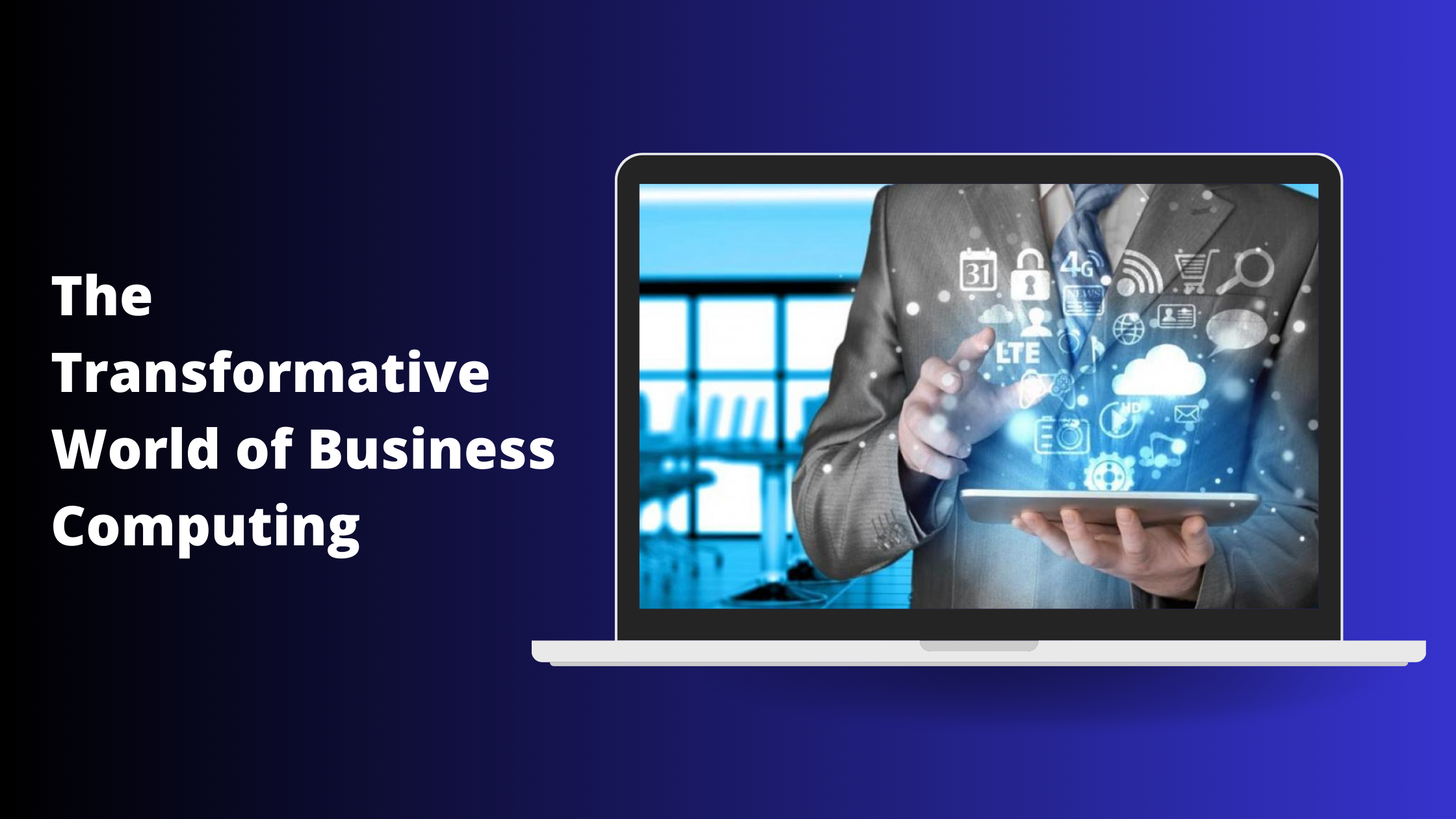Over the past few decades, technology has become the backbone of modern businesses, helping them streamline processes, enhance decision-making, and maintain competitiveness. The world of business computing, once limited to simple automation, has evolved into a sophisticated ecosystem of interconnected technologies. From data-driven insights to the integration of artificial intelligence (AI), business computing now drives innovation across industries.
This article explores the evolution, benefits, trends, challenges, and future of business computing, providing insights into how businesses can leverage it for sustainable growth.
The Evolution of Business Computing

The journey of business computing is marked by revolutionary milestones:
- The Mainframe Era (1950s-1970s):
Large mainframe computers handled bulk data processing, primarily used by big corporations and government entities. They were expensive and required specialized personnel to operate. - The Personal Computer Revolution (1980s):
The introduction of personal computers (PCs) democratized computing. Businesses of all sizes began using PCs for inventory management, payroll processing, and document creation. - The Internet Boom (1990s):
The internet changed the game by enabling global connectivity. E-commerce emerged as a dominant force, while email revolutionized communication. - Cloud Computing (2000s):
Cloud technology allowed businesses to store and access data remotely, reducing the need for expensive on-site infrastructure. Companies began adopting Software-as-a-Service (SaaS) solutions for flexibility and scalability. - Artificial Intelligence and Machine Learning (2010s-Present):
Advanced algorithms now enable predictive analytics, automated decision-making, and personalized customer experiences. Businesses can process vast amounts of data in real time to uncover actionable insights.
Key Benefits of Business Computing
The integration of business computing offers numerous advantages to modern enterprises:
- Enhanced Productivity:
Automation tools reduce manual labor, allowing employees to focus on strategic tasks. Solutions like Customer Relationship Management (CRM) and Enterprise Resource Planning (ERP) streamline operations and increase efficiency. - Data-Driven Decision Making:
Business computing tools provide real-time data analytics, helping leaders make informed decisions. For instance, predictive analytics can forecast market trends, enabling proactive strategies. - Cost Efficiency:
Cloud-based services offer a pay-as-you-go model, eliminating the need for hefty upfront investments in hardware. This makes advanced computing accessible even to small businesses. - Improved Security:
Advanced cybersecurity measures like encryption, firewalls, and multi-factor authentication protect sensitive data from cyber threats. - Global Reach:
Cloud computing and internet connectivity allow businesses to operate seamlessly across borders. Collaborative tools enable teams from different locations to work together efficiently.
Emerging Trends in Business Computing
The future of business computing is shaped by innovative technologies that address modern challenges:
- Edge Computing:
Unlike cloud computing, edge computing processes data closer to its source, reducing latency. It is crucial for Internet of Things (IoT) devices, which are widely used in manufacturing, healthcare, and transportation. - Blockchain Technology:
Blockchain ensures secure and transparent transactions, revolutionizing industries like finance, healthcare, and supply chain management. It minimizes fraud and enhances trust. - Hybrid Work Solutions:
The COVID-19 pandemic accelerated the adoption of remote work technologies. Secure networks, virtual collaboration platforms, and cloud-based tools have become essential for hybrid workforces. - Green Computing:
Sustainability is now a priority. Businesses are investing in energy-efficient data centers and adopting software that minimizes power consumption to reduce their carbon footprint. - Quantum Computing:
Though in its nascent stages, quantum computing promises to solve complex problems in areas like logistics, drug discovery, and cryptography.
Overcoming Challenges in Business Computing
Despite its benefits, adopting business computing comes with challenges:
- Integration Complexities:
Transitioning from legacy systems to modern technologies can be complicated and costly. Companies must ensure compatibility between old and new systems. - Cybersecurity Risks:
With increased reliance on digital tools, businesses are vulnerable to cyberattacks. Implementing robust security measures and regularly updating systems are critical. - Skill Gaps:
Rapid technological advancements demand a skilled workforce. Businesses must invest in employee training and upskilling programs to stay competitive. - Data Privacy Compliance:
Organizations must adhere to stringent regulations like GDPR and CCPA to protect user data. Non-compliance can result in hefty fines and reputational damage.
GenYouTube: A Comprehensive Guide to Download YouTube Videos for Free
Case Studies: Business Computing in Action
- Amazon’s Use of AI:
Amazon leverages AI for personalized product recommendations, inventory management, and delivery route optimization. This approach has made it a leader in e-commerce. - Tesla’s IoT Integration:
Tesla uses IoT to update its electric vehicles remotely, enhance performance, and ensure customer satisfaction. - Walmart’s Data-Driven Strategy:
Walmart uses big data analytics to optimize inventory levels, predict customer preferences, and improve supply chain efficiency.
The Future of Business Computing
The next decade will witness transformative changes in business computing, driven by AI, machine learning, and quantum computing. Here’s what to expect:
- Predictive Maintenance:
AI-powered tools will predict equipment failures in manufacturing, reducing downtime and maintenance costs. - Personalized Marketing:
Machine learning will analyze customer behavior to create hyper-personalized marketing campaigns, improving ROI. - Revolutionized Healthcare:
Quantum computing will enable breakthroughs in drug discovery and genetic research, improving healthcare outcomes. - Decentralized Finance (DeFi):
Blockchain will eliminate intermediaries in financial transactions, making processes faster and more cost-effective.
Conclusion
Business computing is more than just a tool; it is a transformative force that redefines how enterprises operate. By embracing technologies like cloud computing, AI, and blockchain, businesses can achieve unprecedented levels of efficiency, security, and innovation.
However, to harness its full potential, organizations must address challenges like cybersecurity risks and skill gaps. Investing in upskilling, robust security measures, and sustainable practices will ensure long-term success.
The business computing world is not static; it evolves continuously. Companies that stay ahead of trends and leverage emerging technologies will shape the future of their industries, driving growth and creating lasting value.
Whether you’re a small business owner or the leader of a multinational corporation, understanding and adopting the latest advancements in business computing is essential for staying competitive in today’s digital economy.
